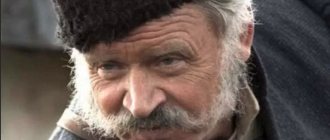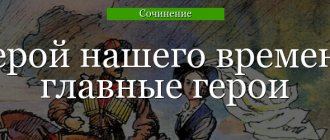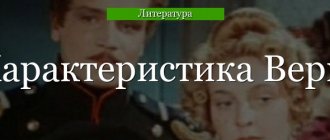Character history
The work of Mikhail Yuryevich Lermontov “Hero of Our Time” is a classic of Russian literature. Critics recognized the serious role of the work, analyzing it and comparing the images and characters of the main characters. Revolutionary in its own way, it gave the public the opportunity to become acquainted with a new type of hero, unknown until that time. It turned out to be Grigory Aleksandrovich Pechorin. The remaining characters set it off, allowing us to better see Pechorin’s role in the novel, revealing the purpose of the hero’s life against the backdrop of the events taking place around him.
a brief description of
Before reading this analysis, we recommend that you familiarize yourself with the work itself, Hero of Our Time.
Full name : Grushnitsky.
Age - about 20 years.
Occupation - military man, at the beginning of the work a cadet, then an officer.
Family - not specified, not married.
Social status : nobleman.
Origin - comes from a noble family.
Upbringing is traditional for noble families.
Education is traditional for noble families.
Appearance - attractive, dark-skinned, black-haired, wears a mustache, well-built, big dandy.
Character - weak-willed, selfish, sentimental, loves to be the center of attention, stubborn, boastful.
Positive traits - great romantic, sentimental, excellent speaker.
Negative traits : narcissistic, selfish, capable of great meanness.
The work is “Hero of Our Time.”
Author - Mikhail Yurievich Lermontov.
History of creation
Writer Mikhail Lermontov's
novel “A Hero of Our Time” is recognized as a new phenomenon in the literature of the 19th century and provokes a lot of discussions among literary scholars. Over time, the plot described in the work does not lose relevance, demonstrating the specificity of the generation to which Pechorin belongs.
The first half of the 19th century was eventful. The book describes the people's reaction to the Decembrist uprising of 1825 and its suppression.
The author describes a character who has advanced thoughts. Due to the fact that it does not correspond to the times, he is out of place everywhere, although he has talents. Lermontov outlines in the book the difficult situation in which people with a living and mobile consciousness find themselves. They are oppressed by doubts and unbelief, and the morality traditional of the generation of their fathers is rejected and trampled upon. Moral norms and values required revision, so Pechorin represented the sufferers of his generation. People of his age cannot use their accumulated personal resources.
Decembrist uprising (1825)
Lermontov depicted reality using new means of artistic expression. The usual confrontation between the hero and his antipode in the novel is presented thanks to Pechorin and Grushnitsky. The characteristics of these heroes allow us to fully appreciate the social characteristics of the younger generation of that time. The revelation of one character through others became Lermontov’s main tool in the work.
Conclusion
In M. Yu. Lermontov’s novel “A Hero of Our Time,” all minor characters are called upon to reveal the complex, multifaceted personality of the main character, Grigory Pechorin. The young cadet Grushnitsky was no exception: his character traits, attitude towards people, towards love turned out to be in many ways consonant with Pechorin.
Grushnitsky's life ends in the most tragic way. But the reason for this is not external circumstances, but the chain of vile actions that were determined by his character. A brief analysis of the role of the hero in the work and his quotation description will allow you to better prepare for a literature lesson, write a report or essay on a given topic.
The collected material, which includes quotes from the text, allows you to independently characterize the character according to plan, help you compose a detailed written work or write an essay on a given topic.
"Hero of our time"
Grushnitsky (actor Leonid Gubanov)
Grushnitsky first appears on the pages of the novel in the chapter entitled “Princess Mary.” His appearance is attractive and makes it possible to make an assumption about the young age of the hero. He is dark, tall, dark-haired and has a neat, fashionable mustache that makes him look older. The soldier's overcoat gives the hero's image a romantic daring. At the same time, he became a soldier and lost his rank due to a duel.
The characterization of the image impresses the reader. This is a selfish, narcissistic man who loves to show off a couple of French remarks, unable to listen to his interlocutor. It’s nice to know that Grushnitsky chose such a mask consciously. In reality, he is different: a sweet and handsome man, not at all a bully.
Pechorin
The negative perception of Pechorin is formed by the fact that the reason for the duel turns out to be trivial. That's what his friends wished. Even Pechorin’s second, Werner, understands the pettiness of the reason for the disagreement. The peace-loving Grushnitsky was not averse to reconciliation, but his friends prevented him from doing so. He is cowardly and nervous. During the duel, the man demonstrates his fear of killing. He cannot kill a person.
A colleague of the main character, Grushnitsky, together with Pechorin, finds himself on the waters. Grushnitsky duplicates the characteristics of his opponent. The only drawback: he has no luck with women. The hero sees his similarity with Pechorin and perceives him as an enemy. The hunt for ladies' hearts also often resembles the behavior of the Grushnitsky prototype. This causes dissatisfaction on the part of the man.
Grushnitsky and Princess Mary
The hero cannot be called a definitely negative or positive hero, because his character is purer, but is replete with tendencies towards vices. Sincerity does him credit. The hero has a positive attitude towards women. He presents himself as a brave man and creates the right image according to the situation. He wants to rise up and loses individuality in the desire to play the chosen role.
Grushnitsky is overly self-confident. This greatly hinders him in his struggle for the love of Princess Mary. The girl does not choose him, and in revenge he is ready to spread rumors and gossip. He tries to set up Pechorin in a duel - he plants a pistol without a charge on him.
Comparative characteristics of Pechorin and Grushnitsky
The difference between the two vivid images in the novel “A Hero of Our Time” is visible to the naked eye. But there seems to be no difference between them in the matter of nobility. Grushnitsky and Pechorin are similar in that they both play with people and live with feelings. Both are sinners.
Art for Lermontov’s work – “Hero of Our Time”
Grushnitsky loved Princess Mary, and Pechorin used her to take revenge on his opponent. Self-confidence and lack of thoughts about the future overwhelm Grushnitsky’s soul. Junker is jealous and indignant, seeing in Pechorin’s actions an attempt to prick him and bypass him.
The differences between Pechorin and Grushnitsky are noticeable from the first meeting. Pechorin is neat and looks nice. An aristocrat, he does not have serious relationships and friendships. Audacity and mystery are combined in the appearance. Such features easily captivate the fair sex. Unlike Pechorin, Grushnitsky comes from a simple family without much income. The guy wanted to become one of the people and deserve a better life. He is obsessed with making an impression, loves to look impressive and please the ladies.
Pechorin is self-confident and reasonable, understands people, demonstrates analytical abilities, cynicism and a tendency to manipulate from idleness, for the sake of fun. Grushnitsky, in turn, does not notice the manipulations, although he is not stupid. A romantic, he is always in high spirits, accustomed to dramatize and exaggerate. He likes to think that he is a sufferer and a person disappointed in life.
Illustration for the novel “Hero of Our Time”
Although the heroes have different biographies, they are like two sides of one soul. Pechorin does not do everything for show. He is real, although his nature is contradictory and complex. Grushnitsky is a petty person and a self-lover who cherishes anger and hatred. Between “to be” and “to seem,” he chooses the second option.
The characters' relationships with society are also different. Pechorin became disillusioned with the ideals of the departing man, but could not find or come up with an alternative. He is restless and useless. Loneliness, fatigue and apathy progress against the background of such thoughts. The hero is opposed to society and the capital's aristocracy. He notices other people's vices.
Grushnitsky loves life and prefers romance to despondency. Therefore, the man is in demand among young people. He did not acquire the positive traits of Pechorin, so he became a caricature of a large-scale image. Thanks to Grushnitsky, the depth of Pechorin’s character is revealed.
Relations between Pechorin and Grushnitsky
These people met in an active detachment, then met in Pyatigorsk, where the cadet came to treat his wounded leg. Outwardly they were on friendly terms, but did not love each other:
- Grushnitsky - for the fact that Pechorin understood his efforts to seem like a creature doomed to secret suffering;
- Pechorin despises Grushnitsky for all his negative qualities, which he saw very well. However, he notes that when he “throws off the tragic mantle,” he is “quite sweet and funny.”
Pechorin treats Grushnitsky condescendingly and with irony. He characterizes him as a romantic fanatic who wants to become the hero of a novel. Grushnitsky’s character was unpleasant to Pechorin due to the fact that the cadet was characterized by such qualities as phrase-mongering and ostentatious courage (“he waves a saber in action, shouts and rushes forward, closing his eyes”).
The conflict between them began when Grushnitsky was offended by a friend who said in front of Princess Mary that he looked younger in his uniform, although he knew that he wanted to seem like an older man. He was even more offended when he learned that Pechorin would dance the mazurka with Mary. The duel between Pechorin and Grushnitsky turned out to be inevitable when Grushnitsky told his friends that Pechorin visited Princess Mary at night.
The murder of Grushnitsky was inevitable for Pechorin, since he agreed to the vile proposal of the dragoon captain, who was his second, not to load Pechorin’s pistol. Pechorin expected that the enemy would show generosity and admit to this meanness of his second, but this did not happen. Conscience still prevented Grushnitsky from immediately shooting at an unarmed enemy, but he fired after the captain called him a coward. The bullet only grazed his opponent's knee. He told his second, Dr. Werner, to load his pistol, since these gentlemen did not put a bullet in it. Then he invited Grushnitsky to renounce his slander and promised to forgive him in this case. But he exclaimed that if the enemy did not kill him, he would kill Pechorin at night from around the corner. Then Pechorin fired.
Thus, the reason for the duel between Pechorin and Grushnitsky is the aggravation of their conflict, which can be described in a few words:
- Pechorin laughs at the cadet's pseudo-romanticism, causing him irritation and anger.
- Then he courts Princess Mary and wins her favor, thereby finally discrediting Grushnitsky.
Film adaptations
The novel “A Hero of Our Time” has been filmed several times. In 1927, director Vladimir Barsky made films based on three separate chapters: “Princess Mary”, “Bela”, “Maksim Maksimych”. It was a black and white movie depicting the events described in the work. Georgy Davitashvili played the role of Grushnitsky.
In 1955, Isidor Annensky directed the feature film “Princess Mary.” The role of Grushnitsky was played by Leonid Gubanov.
Andrei Mironov as Grushnitsky
Anatoly Efros returned to the work in 1975. The director staged the film-play “Pages of Pechorin's Journal” based on the novel. In the role of Grushnitsky - Andrei Mironov.
In 2006, Alexander Kott invited Yuri Kolokolnikov to work on a multi-part project, and Roman Khrushch in 2011 directed Ilya Shcherbinin in the film “Pechorin”.
Image of Grushnitsky
Grushnitsky is a romantic, passionate person, prone to dramatization. He loves to be in the spotlight, demonstrating not his true nature, but the mask of the hero of a vulgar novel.
A distinctive feature of Grushnitsky is phrase-mongering. He loves to speak in long, beautiful, pompous phrases, behind which, in fact, there is nothing. He values external gloss much more than content and in communication literally plunges his interlocutor into the abyss of his florid speeches.
Grushnitsky is completely fixated on his own person and therefore has a poor understanding of people and the psychology of human relationships. He becomes an easy victim of Pechorin's manipulations, as he is distinguished by painful pride and vanity. The narrow-minded, self-satisfied Grushnitsky does not notice either irony or contempt on the part of Pechorin, but immediately reacts to the news of his affair with the princess.
At this moment, Grushnitsky demonstrates the dark sides of his soul. He spreads rumors about the princess in the most vile way, and then agrees to leave Pechorin's pistol unloaded during the duel. And even at the most decisive, fateful moment, pride does not allow Grushnitsky to admit his guilt and repent, which entails a tragic death.
Check out what else we have:
- for the most rational - Summary of “Hero of Our Time”
- for the most impatient - A very brief summary of “Hero of Our Time”
- for the busiest - Reading diary “Hero of Our Time”
- for the coolest - Read “Hero of Our Time” in full



